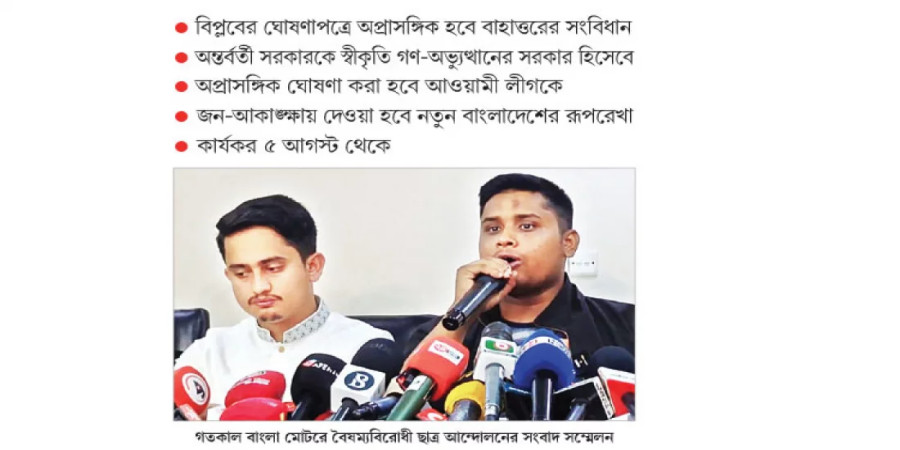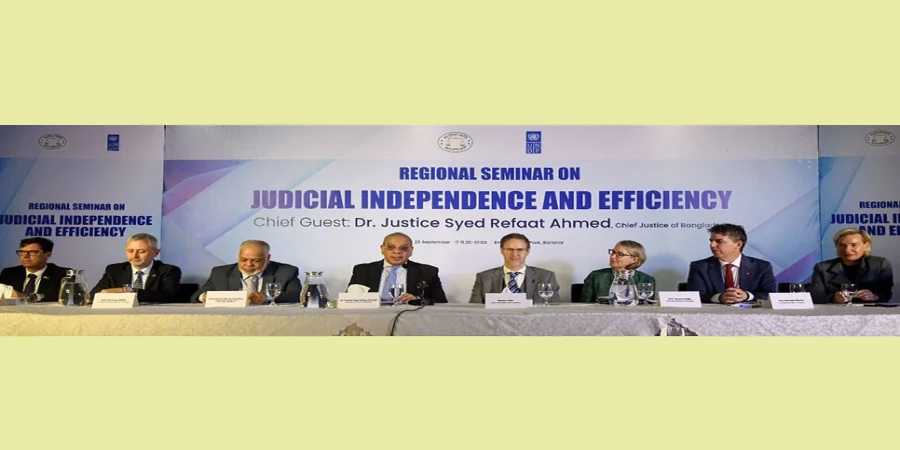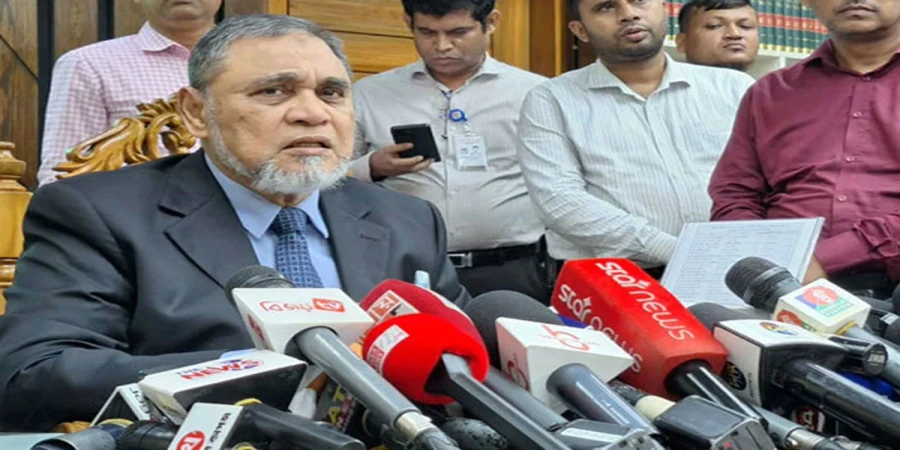
ছবি: Photo: Collected
The Anti-Discrimination Student Movement, in collaboration with the National Citizens’ Committee, is preparing to unveil the "July Revolution Proclamation" on December 31 at the Central Shaheed Minar. This announcement aims to address the legitimacy of the July-August uprising, redefine the aspirations of the people, and set forth a roadmap for a new socio-political framework for Bangladesh.
The proclamation seeks to formalize the events of the student-led uprising, which culminated in the fall of Sheikh Hasina's government on August 5. Although an interim government was formed afterward, it has faced widespread dissatisfaction across various sectors and criticism regarding its constitutional and revolutionary legitimacy. Leaders from the student movement assert that the upcoming proclamation will offer clarity and legitimacy, recognizing the interim government as one born of a people’s revolution.
The proclamation, organizers claim, will redefine the political and social narrative of the nation. It plans to declare the Constitution of 1972 as irrelevant to the current aspirations of the people, citing it as a product of authoritarian rule under Mujibism, which they argue undermined the values of the Liberation War. Additionally, the new proclamation will emphasize the ideals of equality, human dignity, and social justice—core principles enshrined in the 1971 Proclamation of Independence.
The July Revolution Proclamation will incorporate references to significant historical milestones, including the anti-colonial struggle of 1947, the mass uprising of 1969, the Liberation War of 1971, and the anti-autocracy movement of 1990. It will contextualize these events as the foundations of Bangladesh’s political evolution and highlight the July-August uprising of 2024 as a continuation of this trajectory.
Invitations to the December 31 event have been extended to political parties and factions involved in anti-fascist struggles, alongside citizens from diverse walks of life. The proclamation will be presented in the presence of 158 coordinators from the student movement, families of those killed or injured during the revolution, academics, workers, and other community representatives. Though the identity of the reader has not been confirmed, it is likely to be a prominent figure associated with the revolution, such as Nahid Islam, the information and broadcasting advisor, or a survivor or family member of a victim of the movement.
The proclamation will retrospectively take effect from August 5, the day the Hasina government fell, symbolizing the continuity of the revolutionary legitimacy claimed by the movement. This will also reaffirm the July-August uprising as a pivotal moment in the nation’s history, marking the transition from autocracy to a people-led government.
Members of the National Citizens’ Committee revealed that the proclamation intends to discard the "Mujibist Constitution" in favor of a framework that reflects the current aspirations of the people. The committee argues that the 1972 Constitution failed to uphold the principles of the Liberation War and was further eroded by subsequent regimes. By invoking the historical precedents of revolutionary shifts seen in nations like France, South Korea, and Portugal, the proclamation seeks to define Bangladesh’s current transition as the foundation of a "Second Republic."
Critics of the Hasina regime, including members of the Anti-Discrimination Student Movement, argue that the constitutional framework established under Sheikh Mujibur Rahman’s rule deviated from the ideals of independence. They assert that the post-2009 administration led by Sheikh Hasina entrenched a new form of autocracy, often labeled as neo-Bakshalism. The July Revolution, they argue, represents the people’s rejection of these authoritarian legacies, paving the way for a more inclusive and democratic system.
The proclamation is expected to propose integrating the values of the 1971 Declaration of Independence into a new constitutional framework. This includes commitments to equality, human dignity, and justice, alongside guarantees for democratic governance and citizens’ rights. The National Citizens’ Committee has suggested that the July Revolution Proclamation serve as the preamble to a "Second Republic" and lay the foundation for the nation’s future political and social order.
Leaders of the Anti-Discrimination Student Movement emphasized that the proclamation will address the aspirations of all citizens, including marginalized and underrepresented communities. It will reject the influence of foreign powers, which they allege has undermined the sovereignty of the people, and call for a system that truly reflects the will of the masses.
Husnat Abdullah, the convenor of the Anti-Discrimination Student Movement, stated that the proclamation is both a historical and legal necessity. He argued that the failure to issue such a declaration immediately after the fall of the Hasina government allowed forces aligned with fascism to question the legitimacy of the uprising. The bloodshed and sacrifices made during the revolution, he said, cannot be in vain.
The proclamation will also critique the failures of the existing constitutional framework, accusing it of perpetuating inequality and authoritarianism. The National Citizens’ Committee has stated that the new declaration will encapsulate the demands of the people and provide a clear vision for a rebuilt Bangladesh.
Sarjis Alam, a key organizer and general secretary of the July Martyrs Memorial Foundation, described the proclamation as a "founding document" for the nation’s future. He emphasized that the declaration will act as a guiding principle for the next phase of governance, ensuring that the sacrifices of the revolution are honored. Alam stressed that this document would differentiate between the outdated system that people rejected and the aspirations for a new era of governance.
While some have criticized the timing of the proclamation, organizers argue that its delay was due to a lack of support from various sectors. They maintain that the document will provide a comprehensive account of the July-August uprising, offering historical context and laying the groundwork for future reforms.
The December 31 event, they believe, will be a moment of national unity, bringing together citizens from all walks of life to affirm their commitment to rebuilding Bangladesh. Abdullah expressed hope that this proclamation would mark the burial of the Mujibist Constitution and render the authoritarian politics of the Awami League obsolete.
The Anti-Discrimination Student Movement has called on citizens across the country to participate in the event at Central Shaheed Minar, which they see as a continuation of the revolutionary spirit that led to the fall of the Hasina government. They believe this moment will pave the way for a new era of governance, one rooted in the principles of justice, equality, and democracy.
repoter






